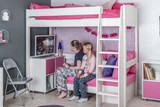Why it’s Advisable to Ban Digital Devices in Children’s Bedrooms
We are living in a digital age; with children becoming increasingly accustomed to technology such as mobile phones and TV’s. On average children are receiving their first every mobile phone at the average age of just 10.3, according to research conducted in 2016. In 2018, experts announced that lack of sleep in children had become a ‘hidden health crisis’; with NHS England statistics revealing that almost 10,000 under 16’s were admitted to hospital throughout the year, with sleep disorders. Whilst said sleep disorders had a variety of contributing factors, excessive screen time before bed and having digital devices in kids bedrooms was cited as one of the main issues at fault.
The Emission of Blue Light Harms the Sleep Cycle
The primary reason why excessive screen time before bed can be attributed to a distinct lack of sleep is the emission of blue light. Exposure to blue light is a regular occurrence in daily life, with everything from phones, tablets and TV screens all exposing this particular beam. And whilst blue light can have productive qualities throughout the day, there’s substantial evidence to suggest that it can have negative effects on sleep. Blue light supresses melatonin; the chemical the body produces when it is preparing for sleep, meaning the body is tricked into believing it’s actually daytime, resulting in sleep inhibition. The use of a screen before bed therefore means that it can often take much longer to get to sleep, and even once finally asleep, exposure to blue light pre-bed time makes it harder to stay asleep, and even harder to wake up again in the morning.
Screens are a Distraction from Sleep
Blue light induced sleep cycle interruption isn’t the only problem with using a device before bed either. Anything that causes simulation and stress before bed can keep the mind awake, therefore it’s advisable to limit children’s screen time to way before bed time itself. It’s also advisable to allow children to partake in any screen time outside of the bedroom, as the bedroom should be associated with sleep first and foremost, to avoid any unnecessary distractions. If screen time isn’t capped, the sleep issues mentioned above can take hold, and with this, come a variety of resulting issues. Lack of sleep in children can induce everything from bad mood, lower school performance, reduced concentration and even links to obesity, making this issue extremely important to consider.
Introduce a Bedtime Routine
Rather than screen time before bed, introducing a specific bedtime routine can help induce sleep. Children respond well to routine, therefore implementing a bedtime routine that involves no screen time for an hour (or longer) before bed could improve sleep quality massively. A bedtime routine can involve several things, ensuring the TV and devices are off, with this time proving not only great for unwinding, but also fantastic for bonding with your child. Potential ideas to include in a relaxing bedtime routine are; a shower or bath, a light snack or drink, a bedtime story or simply using this time as a chance to talk and catch up on each other’s day.
Overall, it could be suggested that there are only positive outcomes to come from banning mobile phones and TV’s from the bedroom. Whilst applying blue light filters to devices in the evening are a helpful supporting mechanism, these tools are still acting as a distraction from sleep, with the best option simply being to keep them away from your child’s bedroom entirely. Not only will this step improve your child’s quality of sleep, but it could also have significant impact on their daily life. Keeping the bedroom, a no screen zone will ensure that the space is optimized for its primary purpose; Sleep!
Recent Posts
-
Unlocking the Potential of High Sleeper Beds for Teenagers
As teenagers go through all the ups and downs of being a teen, their likes and dislikes change a lot
-
Choosing Between a High Sleeper Bed vs. Mid Sleeper Bed
As your little one grows, so do their needs, and finding the perfect kids’ bed for them becomes








